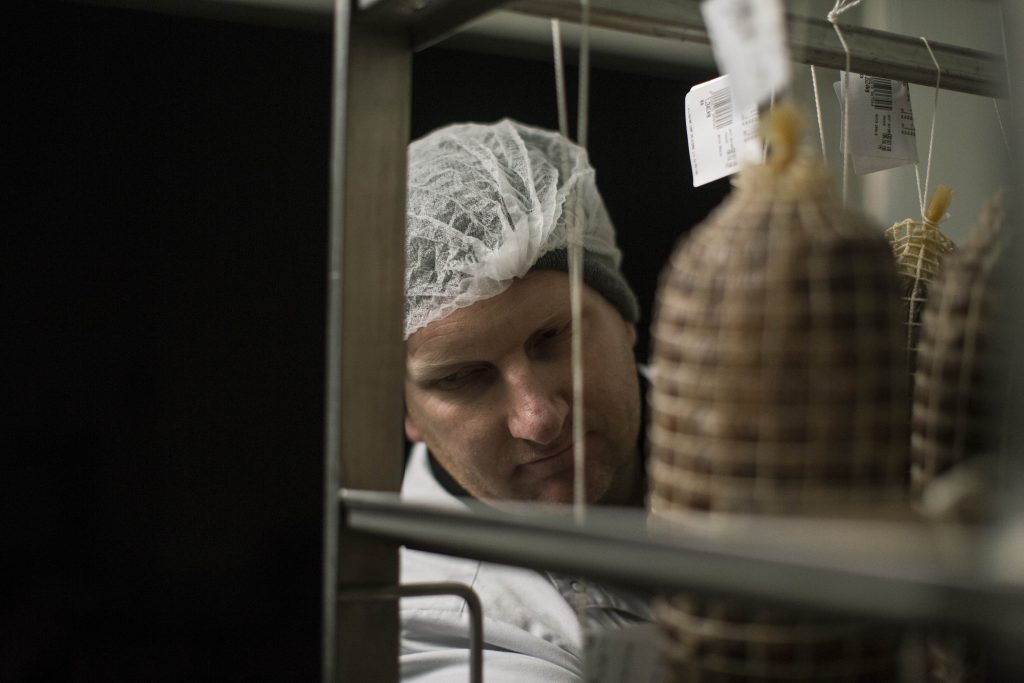Start typing to search
You can also hit “Enter” on your keyboard to submit your query.
0What's on
0Everything Else
The meat maker
Visit Ballarat
18 Feb 2021
Filed underMade of Ballarat
Meet the (meat) man behind Ballarat’s very own Salt Kitchen Charcuterie.
“I’M VERY protective”.
This is one of the first things Mick Nunn says before we enter his workspace. He’s not talking about his family, his house, or his pets. He’s talking about his bacon.
“It’s my livelihood,” he continues, as he hands over the hair nets, preparing us to enter the realms of the Salt Kitchen Charcuterie. Before we make our way into the space, we dip the soles of our shoes in a container filled with disinfectant. The health and safety regulations surrounding the charcuterie are as stringent as they come.
Inside, Mick’s team is working hard on netting some freshly cold-smoked pork. The pork is aggressively spiked to protect the inside and allow it to breathe before it’s taken to the cool-room for 24 hours. “Then we take it to the drying room where it stays for about 12 to 16 weeks,” Mick explains. The paddock-to-plate process isn’t quite as swift as it sounds. It’s a labour of love, patience, and passion.
Mick admits he didn’t grow up in a family that was particularly drawn to food and wine. “I’m not a third generation Italian or French food connoisseur. I’m Skippy the bush kangaroo,” he affirms. “Food in my family was so simple and quite basic, but I was always into it. I just loved it.”
Working as an apprentice at Marios in The Continental and then Grossi Florentino, Mick’s love for food inspired him to move overseas and broaden his horizons as a chef. It was the creative element of the culinary world that always appealed to him.
“The thing I’ve always loved in my 20 years as a chef is making charcuterie,” he says. “That’s why I decided I wanted to set up this business.”
“I think a lot of chefs search their whole career to find what (their passion) is. Some people open a bakery. Some will start a taco shop. Some will go into fine dining. For me, it was always making batches of salami, having a prosciutto hanging somewhere, making terrines and parfaits.”

“There’s a huge of difference between working in a commercial kitchen, where a customer just walks through the front door of a restaurant. Here, there’s a lot of effort that goes into finding whether there is a market for what we’re making. It’s been a real shift in mentality for me.”
Salt Kitchen officially opened the doors of its cool-room in 2015, but its products are in high demand across regional Victoria and the entire country.
“We’ve been really lucky and happy to have gained so much traction,” he says. “Our business strategy is deliberate. We stay within the region and have a local philosophy. It’s smallgoods with provenance.
“We are pitching a mid-to high-end range with our products, and they’re one-farm products, making us a reserve-range charcuterie.”
What does it mean to have one-farm products, I ask? He gives the example of Western Plains Pork, who sets aside an entire paddock of pigs just for Salt Kitchen’s use.
“It’s hard to do,” Mick explains. “It would be much easier to source pigs from multiple parts of the country. But we have to make sure we have to use every part of the pig because we’ve committed to an entire paddock.”
Mick Nunn’s team is comprised of only four members, himself included. “We’re trying to scale up, get bigger and expand,” he says, having started the business as a one-man-show some two years earlier.
Over at the workbench, Mick brings out a selection of smallgoods from the cool-room to showcase. “The fruits of our labour,” he proudly exclaims. He slides his machete through the ham. “It’s beautiful. I’m really happy with that actually. I love the first time I get to cut a ham and see that beautiful cross-section.”
Born and raised in Ballarat, Mick says there has been something of a quiet (yet impactful) revolution taking place in the local food and wine scene. There’s no doubt that he’s been part of that revolution.
“The food and wine scene here has definitely grown by leaps and bounds in the last 10 years,” he says. “When I was first starting out as an apprentice, all the advice I was given was to get out of Ballarat and into Melbourne. Now, I can comfortably say that any young and aspiring chef is able to get his career on track here.”
When Mick talks about his hometown, his eyes light up, not unlike what happens when he refers to his bacon.
“The major reason for me coming back here was the produce of the region. We are smack-bang in the middle of it all and it’s good to take advantage of the fantastic producers we have right at our doorstep,” he says.
“This region is integral to what Salt Kitchen is.”
